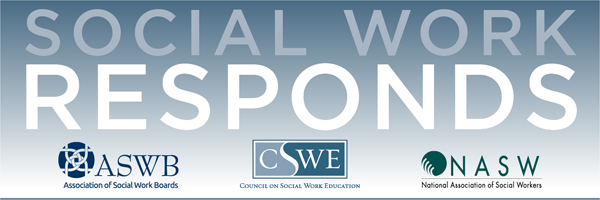Published on : December 1, 2020

About Social Work Responds
The Association of Social Work Boards (ASWB), the Council on Social Work Education (CSWE), and the National Association of Social Workers (NASW) are committed to collaborating on the range of issues affecting the social work profession and the people and communities we serve.
Election 2020: Wins All Around!
Election Day was just 4 weeks ago, but newly elected officials from President-elect Joe Biden to city mayors are already keenly focused on what’s next. What will they do on Day 1 of assuming office? What do their constituents want them to do first? How will they address the inevitable challenges in moving their policy agenda?
Before November 3 is too far in the rearview mirror, let us pause and celebrate the many positive milestones in the 2020 election.
Voter turnout in the presidential race was more than 67%, with record-setting turnouts in many other races. Social workers, educators, and students played a key role in voter mobilization and promoting this key function of our democracy, whether through efforts such as the nonpartisan Voting Is Social Work campaign or direct candidate support.
All social workers up for reelection in the U.S. House of Representatives were reelected. Indeed, there are five social workers in the next Congress, and they are the largest group of mental health provider types in this national body. Reps. Barbara Lee, MSW (CA-13), and Karen Bass, MSW (CA-37), are both on the short list for consideration to replace Vice President-elect Kamala Harris in her Senate seat in her home state of California. Jared Bernstein, PhD, MSW, has been appointed to the National Economic Council. Meg Kabat, LCSW-C, CCM, has been appointed to oversee the agency review team for the transition team for the Department of Veterans Affairs. And Wendy Sherman, MSW, former special secretary for children and youths in Maryland, is under consideration for ambassador to the United Nations.
Hundreds of social workers were elected or reelected to seats in state and municipal government. This includes, among others, past NASW Board Member Martha Guerrero, LCSW, who will now serve as the mayor of the city of West Sacramento, California, after a hard-fought and tight race against a longtime incumbent.
The social work profession once again had a strong voice in elections through NASW’s national and state chapter PACE efforts. These are the profession’s only political action committees, and thanks to the generous contributions of NASW members, they were instrumental in voter mobilization and in endorsing and supporting hundreds of candidates who align with the profession’s Code of Ethics.
NASW-PACE funded field organizers in battleground states, including Arizona, Georgia, North Carolina, Wisconsin, and Florida. Many social workers also volunteered throughout the election by phone-banking for the Healthcare Workers for Biden initiative. NASW-PACE is currently active in the two runoff elections in Georgia for the U.S. Senate, mobilizing members to get out the vote. These races are critical in determining control of the Senate, which has major implications for advancing federal policy.
And as the nation enters its next exciting chapter with a renewed focus on human well-being, social workers will be asked to help solve vexing policy problems ranging from how our country recovers from the COVID-19 pandemic to how communities can ensure health-care access if the Supreme Court overturns the Affordable Care Act.
Social work leaders remain committed to advocating for policies that benefit not only social work practitioners, educators, and students, but also those who support the clients and communities social workers serve. This includes
- protecting marginalized and underserved populations,
- positioning and supporting social workers as champions for behavioral and mental health treatment, and
- ensuring that high-quality social work education is accessible to all.
Social workers, whether clinicians, researchers, or those serving in other roles, will continue to have a crucial voice in policy making and in ensuring that individuals, families, and communities receive the services and supports they need. We are essential workers who bring the right skills, values, and knowledge needed to maximize opportunities for social change created by this election.
RESOURCES
NASW’s correspondence to the Biden Administration transition team outlining key policy priorities can be found online. The detailed transition plan will be available in early January 2021.
NASW’s postelection town hall on November 10 also is available online.
CSWE and other higher education associations sent recommendations to the Biden administration that seek to improve the funding available to programs and students and advance social work priorities. Find all the guidance online at Council on Social Work Education (CSWE) - CSWE Releases Guidance for the Next Administration(Opens in a new window).
There are more than 600 education sessions focused on Leading Critical Conversations: Diversity, Equity, & Inclusion(Opens in a new window) available on-demand from CSWE's Annual Program Meeting. More than 150 of these sessions are available for CE credit. Although the live program is over, social workers and educators can access these sessions through November 2021. Register for the 2020 APM today to access these sessions(Opens in a new window)!

